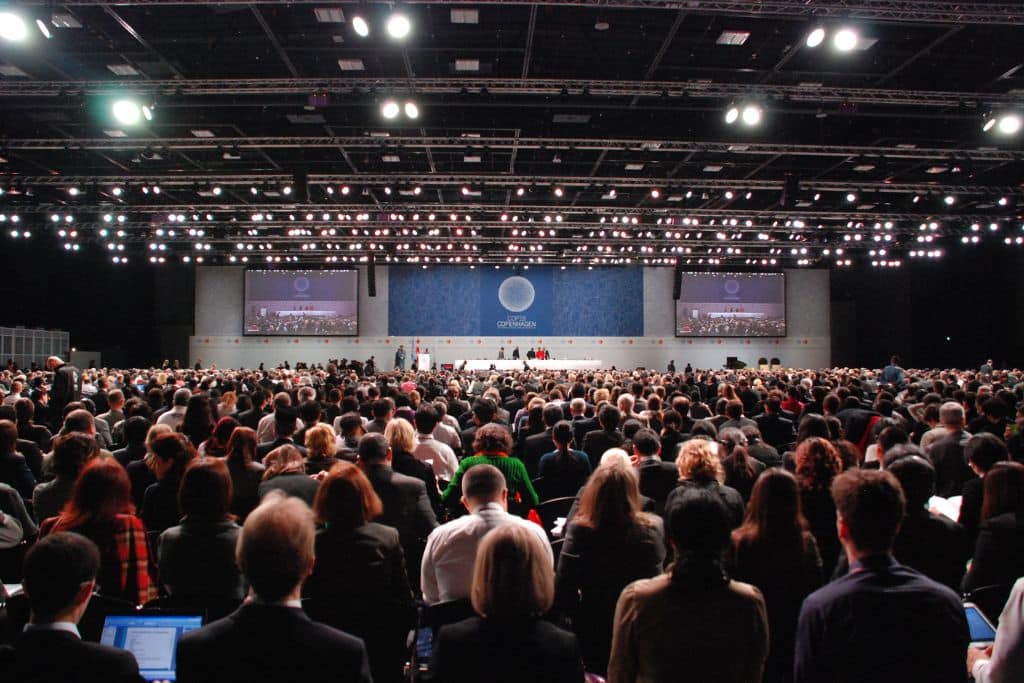The United Nations Framework Convention on Climate Change (UNFCCC) is an international environmental treaty aiming to prevent “dangerous” human interference with the climate system. It has near-universal membership, with 198 countries having ratified the convention. This treaty has provided a foundation for international climate negotiations since it was established in 1994, including major agreements such as the Kyoto Protocol and the Paris Agreement.
—
What Is the UNFCCC?
The United Nations Framework Convention on Climate Change (UNFCCC) serves as a foundational framework for global efforts to mitigate climate change and adapt to its inevitable impacts. While it does not establish concrete targets, it provides a framework for future agreements and policies. Its primary objective is to stabilise greenhouse gas (GHG) concentrations in the atmosphere at a level that prevents dangerous interference with the climate systems, stating that “such a level should be achieved within a time-frame sufficient to allow ecosystems to adapt naturally to climate change, to ensure that food production is not threatened, and to enable economic development to proceed in a sustainable manner.”
Common But Differentiated Responsibility
A fundamental principle of the UNFCCC is the recognition of “common but differentiated responsibility”, acknowledging that, while all countries share responsibility in addressing climate change, industrialised countries are historically major contributors to GHG emissions and therefore bear greater burden in combating this global issue. Furthermore, it acknowledges the importance of economic development to the world’s poorer countries and accepts that the share of planet-warming gases produced by developing countries will grow. The convention also pushes for the provision of financial and technological support to developing countries for action on climate change.
Data-Gathering and Transparent Reporting
The UNFCCC establishes mechanisms for monitoring and reporting on countries’ progress towards their climate commitments, ensuring transparency and accountability in reaching the shared goal. Industrialised countries are required to report regularly on their climate change policies and measures and submit an annual inventory of their emissions. Developing countries report in more general terms on their actions to address climate change and adapt to its impacts. They are required to report less regularly than industrialised countries and their reporting is dependent on availability of funding for the preparation of the reports.
You might also like: A Comprehensive Guide to COP28 and the Global Stocktake
Conference of Parties
Central to the UNFCCC is the annual Conferences of Parties (COP), the decision-making body of the convention. Its purpose is reviewing and advancing the implementation of the Convention. Countries who have joined the UNFCCC meet to measure progress and negotiate multilateral responses to climate change. COPs have created global milestones for the climate movement, setting standards and advancing action. The COP brings together not only the government but also the private sector and thousands of representatives from the civil society, green and polluting industries, and non-governmental organisations to tackle the climate crisis.
The first international climate agreement, was reached during COP21, marking a historic moment in global climate action. The Paris Agreement mobilised parties in taking action to decrease GHG emissions with an agreed-upon goal of staying below a global average temperature increase of 2C above pre-industrial levels but encouraging parties to strive to stay below a 1.5C increase.
You might also like: What Is the Paths Agreement?
In an unprecedented move, the most recent COP, COP28 in Dubai, recognised the need to transition away from fossil fuels for the first time, after unprecedented pressure from the scientific community and the UN, which repeatedly said that limiting global heating to 1.5C is impossible without the phase out of all fossil fuels. In line with the framework, the final agreement acknowledges “common but differentiated responsibility”, with emphasis on phasing out fossil fuels with justice and equity.
Criticisms to the UNFCCC
While the UNFCCC plays a pivotal role in providing a framework to combat climate change and facilitating global cooperation, it still has its shortcomings. The Kyoto Protocol, signed in 1997, was a historical agreement that legally bound key economic players to strict climate targets for the first time. However, by exempting developing countries from the emission reduction commitments, its effectiveness was limited, with China and India – the first and third largest emitters in the world, respectively – experiencing a significant rise in emissions in the decades that followed. By 2012, the year after the first commitment period, global emissions actually rose by 44% from 1997 levels, driven predominantly by the developing nations’ emissions.
Consequently, the US senate refused to ratify the Protocol, with potential damage to the US economy as their reasoning. Their decision evtnaully led to other major countries such as Canada and Japan to pull out of the deal.
COP28 has also been the subject of much backlash. While countries agreed to “transition away” from fossil fuels for the first time, the text does not compel countries to take action and does not set a specific timeline. Furthermore, the COP28 agreement emphasises “the growing gap” between the needs of developing nations and the money provided to cut emissions, but there is no requirement for developed countries to provide more support.
The Loss and Damage Fund agreed upon at COP27 came from the idea that richer countries – historically the main contributors – would have to compensate for the damages caused by climate change in poorer countries. However, this has been deeply contested, with wealthy countries like the US reluctant to accept liability, and only a relatively small amount of money pledged so far.
You might also like: What Is Loss and Damage Compensation?
While the Kyoto Protocol is seen as controversial, it was still a historical agreement that, for the first time in history, raised the alarm and sparked global action. Despite its many controversies, COP28’s stance on fossil fuels remains monumental and the UNFCCC’s role in reaching this point was key. It has provided a crucial framework and platform for global cooperation, addressing complex and urgent issues and setting the foundation for future climate agreements.
Featured image: UNclimatechange/Flickr


















